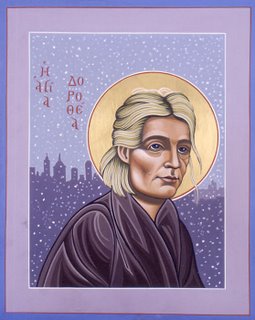In the threefold hierarchy of Holy Orders, which express Christ as Priest, Prophet, and King, the parallel is clear. Bishops oversee, that is govern, God's People. Priests, especially in reconciliation and eucharist (of course bishops are priests and deacons, while priests are also deacons), exercise the priestly ministry. While the entire Church, including those in Holy Orders, is called to be prophetic, deacons are called to be prophetic in a unique way. How well deacons, as a whole, live up to this prophetic calling is a question for another time in a different forum.

This means having no agenda except the Gospel. We all experience the difficulties of being Catholics and voting, be we citizens of the United States, Canada, Australia, Western Europe, or any democracy. In no way are we called to exercise prudential judgment in bringing our faith to bear on life more than in how we vote. In the United States neither political party is reflective of Christian values across the board, this is a cause of consternation for many Christians when voting. That it causes us cognitive dissonance is good, it shows our consciences are engaged and that we are bringing our faith to bear in the real world.
On this day after what appears to be a ground-shaking mid-term election, it seems opportune to post a few extended excerpts of a speech delivered by Illinois Senator Barack Obama. His speech, given at the Sojourners/Call to Renewal Conference held over Pentecost this past Spring, is one of the most articulate, balanced, and sincere statements on the role faith can, does, and should play in the politics of our United States. Especially in his call to people of faith to engage issues in a manner that is "amenable to reason"- reason formed and informed by faith, but reason nonetheless. Why? Because our proposals, for example in favor of life, family, and marriage, must be subject to argument and discussion in order to be persuasive enough to carry the day. We must be careful not to forsake the rest of what our faith demands of us for the sake of just a few issues, however. What about poverty? What about peace and justice? What about capital punishment, racism, sexism, issues related to globalization? What about the environment? It stands to reason that these issues are connected to the more fundamental issues of life and family.
On those issues, Senator Obama says:
"Our fear of getting 'preachy' may also lead us to discount the role that values and culture play in some of our most urgent social problems. After all, the problems of poverty, racism, the uninsured, and the unemployed are not simply technical problems in search of the perfect 10-point plan. They are rooted in both societal indifference and individual callousness -in the imperfections of humanity.
"Solving these problems will require changes in government policy, but it will also require changes in hearts and a change in minds. I believe in keeping guns out of our inner cities, but I also believe that when a gang-banger shoots indiscriminately into a crowd because he feels somebody disrespected him, we've got a moral problem. There's a hole in that young man's heart a hole that the government alone cannot fix."

This seems to me the summary, the heart, of what from Sen. Obama is trying to communicate:
"Democracy demands that the religiously motivated translate their concerns into universal, rather than religion-specific, values. It requires that their proposals be subject to argument and amenable to reason. I may be opposed to abortion for religious reasons, but if I seek to pass a law banning the practice, I cannot simply point to the teachings of my church or evoke God's will. I have to explain why abortion violates some principle that is accessible to people of all faiths, including those with no faith at all."
To read the full speech of Senator Obama follow this link: One Nation ... Under God?


No comments:
Post a Comment